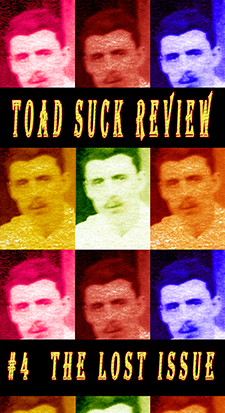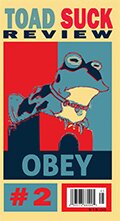As an unpublished poet, my being an artist is still most fulfillingly defined by my not being anything else. I bartend and wait tables and float financially. I make just enough to get by, but never so much as to threaten to overshadow the payday I determinedly believe writing holds for me. My conviction runs deep and tends to draw in others, further convincing me.
For a few years, I live with a woman who, in sympathy with my poetic plight, patiently pays more than her share of the bills. I compensate, I believe, in emotional stability, as she’s tends toward imbalance. This arrangement eventually leads to our ruin; she resents my poverty, and I’m so drained by her emotional neediness I can’t write anyway.
When Bernie and I move in together, it’s clear I need to make my own money. One thing I can do is write, although I’ve studiously protected that ability from anything that might bring in cash. A friend has been a copywriter in London before relocating to Scottsdale, where he continues this work. He starts giving me a project here and there. But then we have a personal falling out and he leaves me to my own devices.
I have virtually no experience, no clients and no money. But I’m intent on starting my own freelance copywriting practice. For what they pay an entry-level copywriter in an ad agency, I figure I can hustle up freelance projects and leave myself time for my own writing as well.
I learn that advertising agencies typically have writers on staff, so I target graphic design firms for my barrage of cheerfully desperate cold calls. I call every graphic design firm in town, from the larger firms of ten or more, down to the freelancers working at their kitchen tables. I exaggerate my experience sufficiently to suggest that I have some, but not so much as to expose myself for the liar I so patently am.
Three years seems about right. Three years if I did have it, I believe, would relieve me of the ignorance and anxiety in which I now operate. How I wish it were true. And not just something I say on the phone to prospective clients. But repeating over and over starts to reassure me a little bit. “Yeah, I’ve been freelancing for about three years, working with a range of clients . . .”
To build up my portfolio, I write for everyone. I write about a window shade company for a little freebie advertorial magazine that takes six months to pay. I write a human resources newsletter for the electric company. I write for some software start-up that serves multilevel marketing companies. In a TJI Fridays, I meet a guy in a green suit and cowboy boots who claims to be a pornographer. I say, “sure, I can help you with that.” The project never comes about, but I’m not the holdup.
I track my projects in a hardback school lab notebook. Its cloth binding seems to connote the permanency of a business that’s going to make it. Vaguely reminiscent to me of some ledger out of Dickens, it keeps the book in bookkeeping in a way I find comforting. I assign each month its own page, and each project its own line on the page, even if there are only two or three lines worth of projects. I fear the book will never fill up. But I also fear that it will. Building a solid business is not the way Hemingway described becoming an artist in A Moveable Feast. I’m supposed to be honing my craft in some “clean, well-lighted place,” living on whatever I can win at the track or otherwise scrounge up without putting myself out too much.
One Saturday, our housemate, Jim, comes home excited. He’s found a fine Italian clothier going out of business, selling everything for half off or more. Jim is an enthusiast of life. He’s always excited about something–the restaurant he just ate at, the movie he just saw. Bernie is skeptical. She would rather pay full price for one quality item, than mess around with anything lesser, discount or no. I really don’t care. I get by with what I’ve got. I can’t afford to dress too well, and I’m fine with it.
Jim’s enthusiasm carries the day and we all drive over to check it out. We live just south of the Scottsdale Airpark, a new commercial area at the north end of town, built around the Scottsdale Commuter Airport. Of course, the clothier is failing; they’re selling Italian designer fashion next door to an auto upholsterer. But Bernie is impressed with the quality. She and Jim wade in. I follow reluctantly. The blouses and slacks are dressier than anything I ever wear. Even half off, they’re still expensive to me.
Jim, with multiple shirts draped over his arms, says, “Joe, you’ve got to get in on this.”
I realize I’m going to end up putting out a couple hundred bucks on clothes and I’m not happy about it. I don’t spend my money on clothes; I spend it on time to stare at my notebooks. I buy three really nice silk shirts and a pair of black pants. I’ve revolutionized my wardrobe and I feel only loss.
Back at home, in our bedroom, Bernie says, “I need to talk to you.”
I dread these talks; only good can come of them. But it’s at the expense of long cultivated isolation. My Cancerian nature is offended by the presence of another within my most inner perimeter. I spent my so-called formative years accumulating this shell, thickening it organically around me, layer by invisible layer, like some primitive ocean creature, retiring into itself for the long, underwater oblivion. Instead, I’m now being washed up and exposed onto strange shores.
“You need to be more into money,” she tells me.
Objections rise in my body disguised as logic, as reason, as experience. But really, they are my parents’ position on money: the less said the better, the less spent the better, with the glaring exception of an elite college education being just Jewishly abstract enough to pass muster.
“You can make good money,” Bernie says. “You deserve it.”
I don’t say it, but I am thinking: it’s money or art, you can’t have both. But Bernie is a have-it-all kind of gal. “If you want to be an artist, be an artist, just don’t be a starving one.”
I’m thinking of Yeats’ fascination with what’s difficult. It actually comes to mind. That alone makes me some sort of an artist, doesn’t it? Who thinks such things in real-time? Sometimes I miss my Vassar College professors, I really do. Who will recognize my weird undergraduate talents now?
But what am I trying to achieve by way of all this difficulty?
Happy childhoods seem to conclude more or less on time, but discontented childhoods drag on and on, as if they can still somehow be righted if we’ll just hold out long enough.
I’ve kept mine alive by remaining professionally immature, under the auspices of art. But haven’t I just converted a childhood’s struggle for affection into a grownup’s struggle for artistic recognition? Isn’t the whole enterprise of earning affection a twisted one? Was that Yeats’ problem too?
But Bernie doesn’t want to talk about art. She wants to talk about money. And there’s nowhere to go in this bedroom. It’s about 20 by 20 with a queen-sized bed taking up most of that area. We end up sitting on the floor in the small space between the side of the bed and the wall. I’ve collapsed there in frustration and shame. Why is there always shame before the change? Perhaps it’s just the Cancerian’s trauma of being exposed, unshelled. Or is it shelled. After all, just acknowledging the shell is an undressing of sorts.
Coming from a family of critics, it’s still hard to feel someone telling me to alter my course isn’t putting me down. Never the less, a defenseless clarity comes over me; I can be honest with Bernie, she’s not picking me apart. I say the most obvious thing:
“I want more money.” My business is limping along. I’ve got $20,000 on credit cards. That’s way too close to the $35K I made last year. “I want more money.”
She takes both my hands in hers. I feel something like bands open on the muscles of my forearms, and energy starts to flow through from fingertip to shoulder. “You can have it,” she says.
I say yes, because what else can I say? I’m not sure, but the only certainty is where I’ve come from; so all progress lies in uncertainty.
It’s only a few weeks later that a call comes from the Phoenix rep of a Portland-based design firm. I recently contacted them to describe to them my three years of experience, my eagerness to be of assistance. They need some help on a project with the world’s leading chip manufacturer. They need a lot of help. They need a whitepaper written and they need four others edited. How much would I charge for this? I, of course, have no idea. For starters, what’s a whitepaper? Isn’t all paper white?
In the energetic manner of account executives, the Phoenix rep is dominating the conversation any way, so I try to draw her out. How long of a whitepaper are they looking for? What are they trying to achieve?That’s always a good question, disguising my ignorance as strategic thinking. But the rep takes this as a pushback, like I’m resisting her on some level.
“Ok, ok,” she says, as if we’ve been talking about this the entire time, “the most I can go on this budget for you is $20,000, and that includes your whitepaper and editing the four others.”
I say, “Ok,” in a level tone, as if indeed we have been negotiating back and forth, thus arriving at these fair and final terms.
There remains only the problem of writing this whitepaper. Not to mention editing the other whitepapers.
I am introduced to product people and marketing people down at the wafer fab in Chandler. I am supposed to interview them on the topic and then write the whitepaper. I ask them: “What are we looking to achieve?”
The product manager tells me that he and his team are “still trying to define aspects of this initiative.” I nod understandingly; I feel exactly the same way. But I can’t let them off the hook entirely, saying, “We are going to have to firm up some of this messaging along the way, so that the piece as whole feels directed and substantial.”
I may not know how to write, but I’m learning how to talk about it.
Meanwhile, I contact the other two writers, who are in fact experienced technical writers. I take a collaborative posture in “advising” them, trying to glean some details of what the hell is expected of this whitepaper. I’m empowered to find them as uncertain as I am. That’s the beauty of the creative process; no one can really say what it should look like.
I start receiving tons of background documents. The vagueness of the business language frustrates me. I hope finally after several meetings and conference calls that I could find out what this product line actually is. I thought I could read my way out of my ignorance. But such explicit explanation is nowhere to be found. Nobody seems to need it but me. Then it dawns on me: I can write in the same vague vein and no one will mind–they’re used to it.
Indeed, my first draft is received with little comment. I’m a good scanner and I’ve picked out salient points and cobbled together a ten page singled spaced document based on these. I put in some action-oriented headlines, like all the copy writing books say you should, and submit it.
The process, it turns out, is as ambiguous as the language. There is no definite feedback one-way or the other. The other writers are a little edgy about this, so I am too. I contact the account executive who has an entirely different set of concerns that she describes to me in detail. She doesn’t want to live in Phoenix; she doesn’t like Phoenix. She wants to move to Southern California . . . she’s a writer herself, she wants to write screenplays. Do I write screenplays?
The other writers send me their whitepapers. Thankfully, they have not read the book about action-oriented headlines. So I rewrite their headlines and submit their whitepapers along with my own, which I’ve revised as well, based on some additional, yet still vague, information provided me.
I’m still waiting for the other shoe to drop when the AE calls me back a couple weeks later. “The project is canceled,” she says. “But don’t worry, you’ll get paid.”
“Canceled,” I say, trying to keep the relief out of my voice, “what happened, they don’t need the whitepapers?”
“No, the whole product line is cancelled. They decided they’re not ready to launch yet.”
I think: me and the world’s largest chip manufacturer, we’ve been on the same page all along.
 '
'
 '
'
 '
'
 '
'